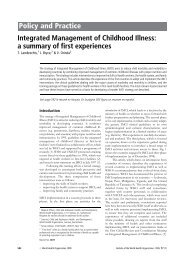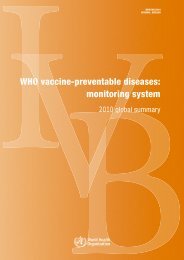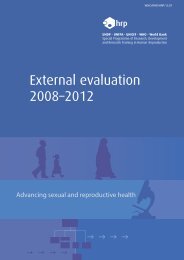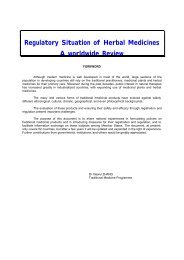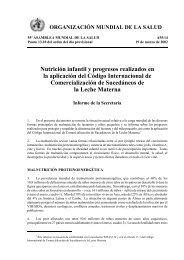IPDE - Extranet Systems - World Health Organization
IPDE - Extranet Systems - World Health Organization
IPDE - Extranet Systems - World Health Organization
Create successful ePaper yourself
Turn your PDF publications into a flip-book with our unique Google optimized e-Paper software.
49 <strong>IPDE</strong><br />
dimensional scores are not only useful to the clinician, but they also provide<br />
the research investigator with greater reliability and more versatility<br />
in data analysis.<br />
Appropriate subjects<br />
The <strong>IPDE</strong> is not intended for subjects below the age of 18, although with<br />
slight modifications some investigators have found it useful with those<br />
as young as age 15. The interview is not appropriate for those with<br />
severe depression, psychosis, below-normal intelligence, or substantial<br />
cognitive impairment. Whether it should be used with patients in remission<br />
from a chronic psychotic illness is somewhat problematic. For<br />
example. can one distinguish residual schizophrenia or the interepisodic<br />
manifestations of a bipolar disorder from a PD? A number of investigators<br />
have found the IF'DE useful in studies of those disorders, and the<br />
decision is left to the discretion of the user.<br />
Limitations of the <strong>IPDE</strong><br />
The <strong>IPDE</strong> is essentially a self-report instrument, and assumes that a person<br />
is capable of providing a valid description of disturbances in his personality.<br />
However, an individual may be unaware of some of his traits.<br />
He may also be resistant to acknowledging behaviour, if it is socially<br />
undesirable or if he thinks its disclosure is likely to adversely affect his<br />
best interests. This is especially likely to occur in patients who wish to<br />
terminate treatment prematurely, or in those about to be discharged from<br />
a mental health facility. Others may exaggerate disturbances in their<br />
behaviour. This is sometimes observed in those who are frantically seeking<br />
help, or who are dissatisfied with their treatment or the amount of<br />
attention they are receiving. It may also be a reflection of certain personality<br />
traits. Although subjects may also feign traits or behaviour, particularly<br />
in compensation cases and some forensic and military situations,<br />
the IF'DE discourages this by requiring documentation with convincing<br />
examples, anecdotes, and descriptions.<br />
Patients in a dysphoric state may have a selective recall or distorted<br />
perception of some personality traits. They may also confuse them with<br />
the symptoms of another mental disorder. There is evidence that the<br />
interest may be resistant to such trait-state artifacts in patients with<br />
mild to moderate symptoms, but additional research is required on this<br />
important subject. When possible, some investigators may wish to









